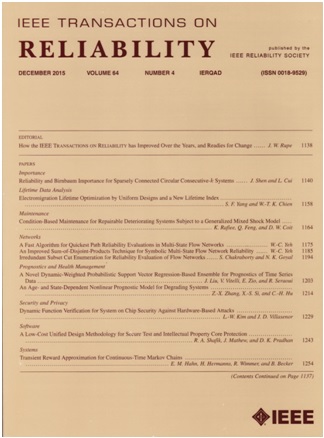Reliable-RPL: A Reliability-Aware RPL Protocol Using Trust-Based Blockchain System for Internet of Things
IF 5.7
2区 计算机科学
Q1 COMPUTER SCIENCE, HARDWARE & ARCHITECTURE
引用次数: 0
Abstract
Routing protocol for low-power and lossy network (RPL) is a routing protocol for resource-constrained Internet of Things (IoT) network devices. RPL has become a widely adopted protocol for routing in low-powered device networks. However, it lacks essential security features, including end-to-end security, robust authentication, and intrusion detection capabilities. Blockchain is a decentralized and immutable digital ledger that records transactions across multiple computers. It provides privacy, transparency, security, and trust. In this work, we proposed a blockchain-based reliable RPL protocol called reliable-RPL, which uses node reliability, link reliability, and relative trust scores of RPL-enabled IoT devices. The parent selection and network topology formulation are based on the proposed reliability-aware objective function. A lightweight ECC-based scheme performs registration, identification, and authentication of RPL-enabled IoT devices. The consistent topological updates from these authenticated IoT devices are used to secure routing paths in RPL-enabled networks. Using a modified trickle algorithm, we employed a reputation-based trust system that monitors and labels malicious nodes based on their reliable activities. The novelty of the proposed framework relies on integrating Contiki-NG (as fronted for IoT network simulation) and Hyperledger Fabric (as a backend for blockchain-based device authentication and trust-based attack resilience regarding rank, replay, sinkhole, and route poisoning attacks). The experimental evaluation of reliable-RPL has demonstrated its effectiveness compared to state-of-the-art methods regarding significant performance metrics, including packet loss, routing overhead, and throughput on Hyperledger Caliper.可靠RPL:一种基于信任的区块链系统的物联网可靠感知RPL协议
低功耗损耗网络路由协议(RPL)是一种针对资源受限的物联网(IoT)网络设备的路由协议。RPL已成为低功耗设备网络中广泛采用的路由协议。但是,它缺乏必要的安全特性,包括端到端安全性、健壮的身份验证和入侵检测功能。区块链是一个分散的、不可变的数字分类账,记录了多台计算机之间的交易。它提供隐私、透明、安全和信任。在这项工作中,我们提出了一种基于区块链的可靠RPL协议,称为reliable-RPL,它使用节点可靠性、链路可靠性和支持RPL的物联网设备的相对信任分数。基于所提出的可靠性感知目标函数进行父节点的选择和网络拓扑的构建。轻量级的基于ecc的方案对启用了rpl的物联网设备进行注册、识别和认证。这些经过认证的物联网设备的一致拓扑更新用于保护启用了rpl的网络中的路由路径。使用改进的涓流算法,我们采用了基于声誉的信任系统,该系统根据恶意节点的可靠活动监视和标记恶意节点。提出的框架的新颖性依赖于集成Contiki-NG(作为物联网网络模拟的前端)和Hyperledger Fabric(作为基于区块链的设备认证和基于信任的攻击弹性的后端,涉及等级、重播、天坑和路由中毒攻击)。可靠rpl的实验评估已经证明了它与最先进的方法在重要性能指标方面的有效性,包括丢包、路由开销和Hyperledger Caliper上的吞吐量。
本文章由计算机程序翻译,如有差异,请以英文原文为准。
求助全文
约1分钟内获得全文
求助全文
来源期刊

IEEE Transactions on Reliability
工程技术-工程:电子与电气
CiteScore
12.20
自引率
8.50%
发文量
153
审稿时长
7.5 months
期刊介绍:
IEEE Transactions on Reliability is a refereed journal for the reliability and allied disciplines including, but not limited to, maintainability, physics of failure, life testing, prognostics, design and manufacture for reliability, reliability for systems of systems, network availability, mission success, warranty, safety, and various measures of effectiveness. Topics eligible for publication range from hardware to software, from materials to systems, from consumer and industrial devices to manufacturing plants, from individual items to networks, from techniques for making things better to ways of predicting and measuring behavior in the field. As an engineering subject that supports new and existing technologies, we constantly expand into new areas of the assurance sciences.
 求助内容:
求助内容: 应助结果提醒方式:
应助结果提醒方式:


